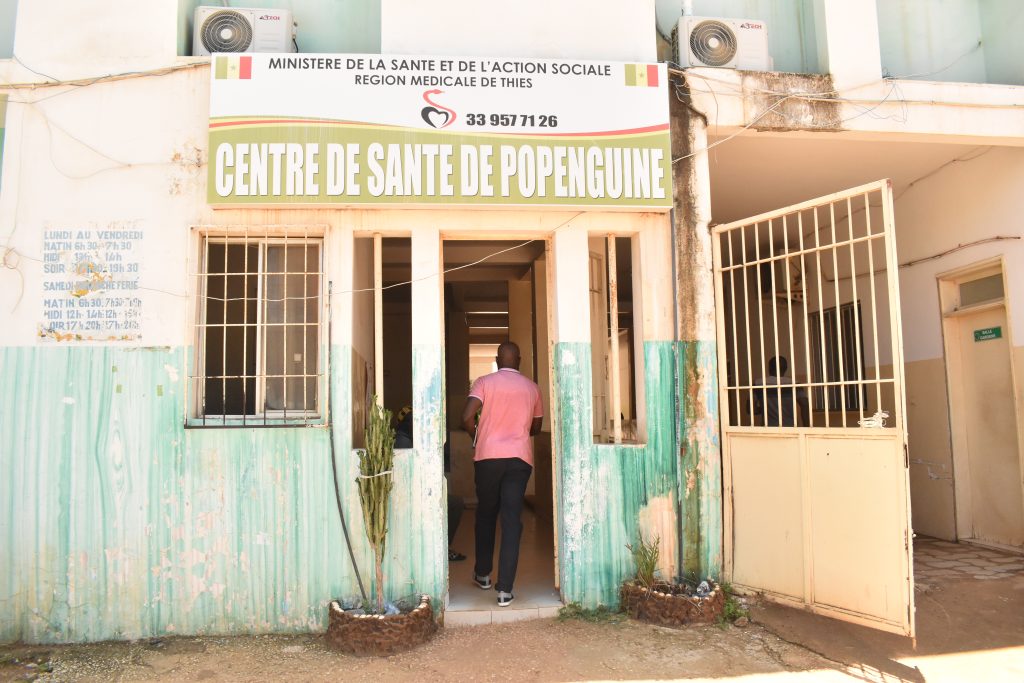When he arrived at the Kirène health post in 2015, Demba Bodé, head nurse of the post had found a worrying nutritional situation. "There were many cases of severe acute malnutrition (SAM) and moderate acute malnutrition (MAM) in children aged 0 to 5 years." The post supported by the District of Popenguine was doing its best with prevention activities (screening and weighing), which were not sufficiently effective to fight malnutrition in the area.
ENDA Santé, whose mission is to support vulnerable populations and its project entitled "Wër Werlé", through the nutrition component, came to support the District of Popenguine. It has deployed several actions in the different localities of the District aiming at promoting and improving nutritional knowledge and empowering women through the conceptualization and implementation of children's granaries and the organization of cooking demonstrations.


Fouck and Keur Ndiaye Lô, two localities located in Kirène, were the first sites to start the experiment. Community meals accompanied by culinary demonstrations are organized every month. A pretext to mobilize mothers and children as well as community actors to share good culinary practices and raise awareness on this issue. The idea is also to make the fight against malnutrition a community concern but also to equip women so that they can reproduce the meals (good practices) once at home. A local dish is then cooked with local condiments collected by the mothers at the community level, served to the children and the mothers.
The positive effects of granaries and cooking demonstrations on malnourished children
After 3 months of activities, the management of these cases of malnutrition had borne fruit in both areas. "The SAMs were taken out of the red zone and became MAMs and the MAMs recovered", rejoices the head nurse of Kirène, Mrs Demba Bodé.
This pilot experience was then generalized to all areas of the Popenguine District. Today, ENDA Santé has installed 33 granaries. With its operational partners, it plans to expand and add 23 other granaries to strengthen the achievements. And in 5 years of intervention (2017 - 2022), the cumulative number of children affected by (SAM) has dropped from 454 to 16 children and that of MAM from 85 to 22.


To supply the granaries and ensure their sustainability, the Wër Werlé project, financed by Horizont3000, has developed market gardening areas with women in the localities of Kirène, Dobour, Kignabour 1 and 2, Popenguine... They are managed by women, organized in management committees or in women's promotion groups. All of them have been trained by ENDA Santé on the techniques of table cultivation and the production of fertilizers and natural organic fertilizers based on plants in order to produce healthy vegetables, free of chemical products.
In Kignabour 1, on the road to Popenguine, a group of women run the market garden. Due to the lack of land, they cultivate a plot of land within the health center, behind the building. Different varieties are grown there: lettuce, eggplant, chili, okra, cabbage, sorrel, tomatoes, peppers and onions. "Part of the harvest feeds the granary of the local child. A small amount of money from the sale of the vegetables is also paid into the granary account," says Saly Thiao, a member of the group.
Not far from there, in Kiniabour 2, the Amsukoh Kad Fiki group (in French, ensemble pour un avenir meilleur) is developing a market garden. In addition to supplying the granary, they regularly contribute to the organization of community meals. "ENDA Santé facilitated the installation of the granary and supported us with kitchen equipment. In addition to the in-kind contributions that we make (cowpeas), there is good community participation (village chief, the Imam, men, mothers, goodwill) in the meals that we organize for the children. We have organized three community meals during the month of June. Today, the population is aware of the usefulness of the granary and the need for its perpetuation. They no longer want to see a malnourished child", Ngoné Sène relais, member of the circle.


A transfer of skills, know-how of good agricultural and culinary practices assured
We observed the same dynamics everywhere we went, in Kirène, Dobour. In Honkoma more precisely, in Sindia, the team attended a cooking demonstration. It was 5pm when the meal was served of "Ngourbane", a local dish made of millet and peanuts accompanied by smoked and dried fish. Here, good culinary practices, the valorization of local products and the promotion of organic culture are emphasized and encouraged. Community participation is also a reality and we feel that the strategy has been appropriated by the population. "The condiments used for the preparation of the meal were the fruit of a collection of mothers, fathers, the village chief, the Imam and other goodwill. Everyone gives what they have and regularly supports the organization of cooking demonstrations as best they can" Halima Kâ, community relay and Home Care Dispensary (DSDOM) in Honkoma.
In Kirène, the head nurse of the post Bodé Demba still remembers a malnourished child who particularly marked her.
It was always in the red despite our interventions. But thanks to the know-how and good culinary practices inherited from the project, we were able to recover it. Today, it has grown and is doing well. proudly supports the ICP of Kirène.
The women shared their appreciation of the project with the team:
In addition to the culinary demonstrations we organize, we also spread the practices in our homes for the benefit of children but also the elderly and pregnant women. Concerning the market gardening, good practices in terms of environmental preservation are observed since we consume organically produced vegetables. We produce our own fertilizer and organic fertilizers and participate in our own way to preserve the environment.
Astou Ndour, general secretary of the women's group of Kiniabour 2


